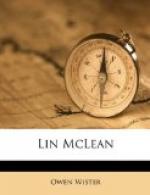“Going to Denver?”
“Why, maybe.”
“Take in San Francisco?”
“Sounds slick.”
“Made any plans?”
“Gosh, no!”
“Don’t want anything on your brain?”
“Nothin’ except my hat, I guess,” said Lin, and broke into cheerful song:
“’Twas a nasty baby
anyhow,
And it only died to spite us;
’Twas afflicted with the cerebrow
Spinal meningitis!’”
They wound up out of the magic valley of Wind River, through the bastioned gullies and the gnome-like mystery of dry water-courses, upward and up to the level of the huge sage-brush plain above. Behind lay the deep valley they had climbed from, mighty, expanding, its trees like bushes, its cattle like pebbles, its opposite side towering also to the edge of this upper plain. There it lay, another world. One step farther away from its rim, and the two edges of the plain had flowed together over it like a closing sea, covering without a sign or ripple the great country which lay sunk beneath.
“A man might think he’d dreamed he’d saw that place,” said Lin to the foreman, and wheeled his horse to the edge again. “She’s sure there, though,” he added, gazing down. For a moment his boy face grew thoughtful. “Shucks!” said he then, abruptly, “where’s any joy in money that’s comin’ till it arrives? I have most forgot the feel o’ spot-cash.”
He turned his horse away from the far-winding vision of the river, and took a sharp jog after the foreman, who had not been waiting for him. Thus they crossed the eighteen miles of high plain, and came down to Fort Washakie, in the valley of Little Wind, before the day was hot.
His roll of wages once jammed in his pocket like an old handkerchief, young Lin precipitated himself out of the post-trader’s store and away on his horse up the stream among the Shoshone tepees to an unexpected entertainment—a wolf-dance. He had meant to go and see what the new waiter-girl at the hotel looked like, but put this off promptly to attend the dance. This hospitality the Shoshone Indians were extending to some visiting Ute friends, and the neighborhood was assembled to watch the ring of painted naked savages.
The post-trader looked after the galloping Lin. “What’s he quitting his job for?” he asked the foreman.
“Same as most of ’em quit.”
“Nothing?”
“Nothing.”
“Been satisfactory?”
“Never had a boy more so. Good-hearted, willing, a plumb dare-devil with a horse.”
“And worthless,” suggested the post-trader.
“Well—not yet. He’s headed that way.”
“Been punching cattle long?”




